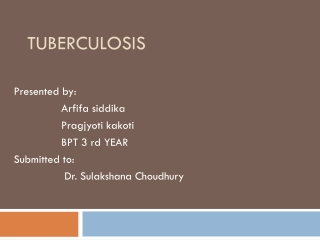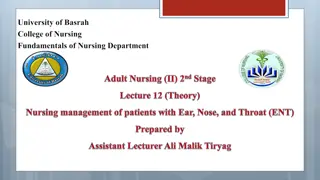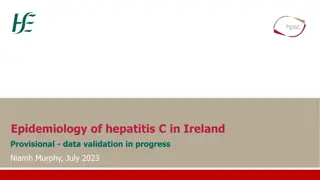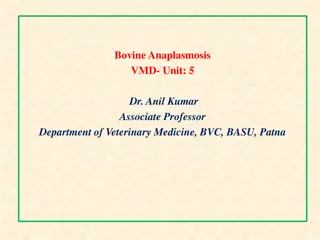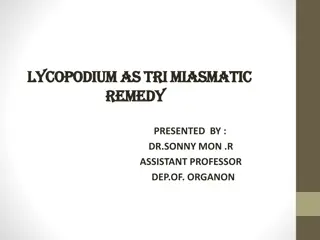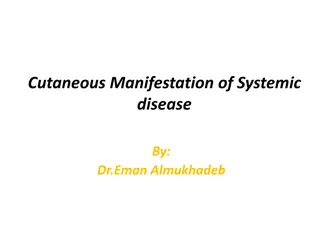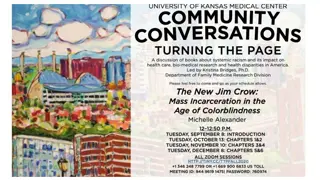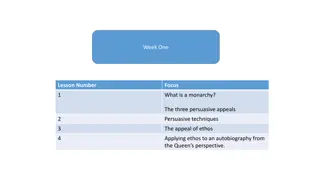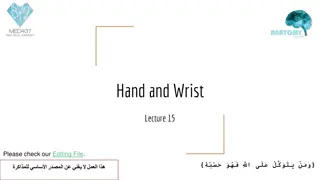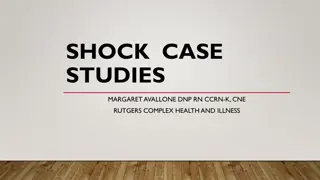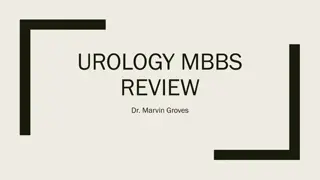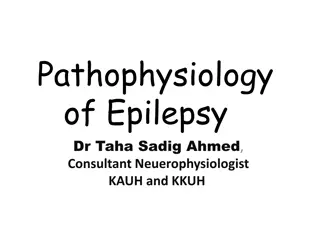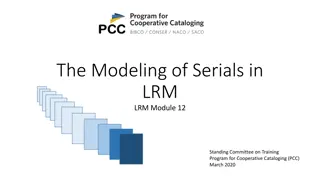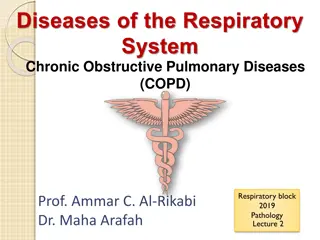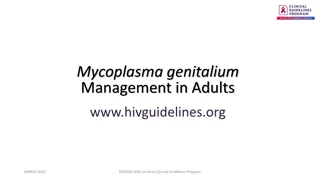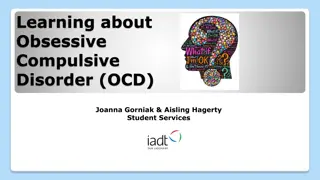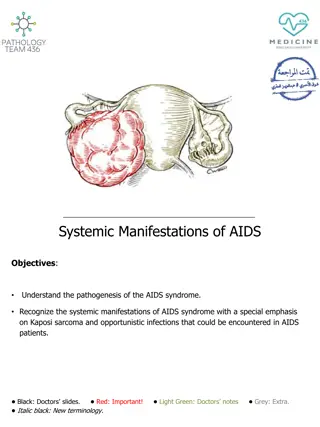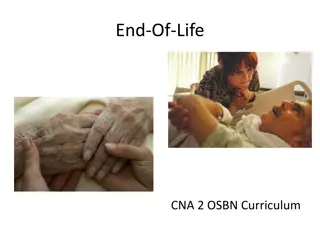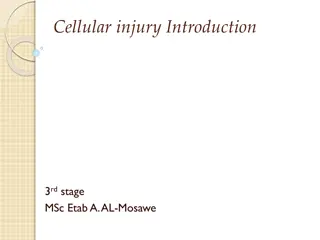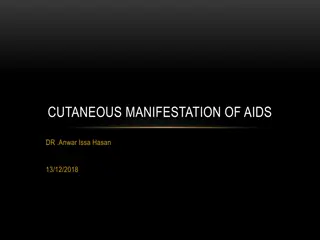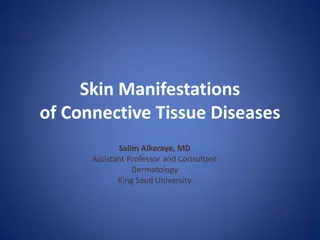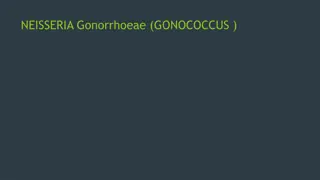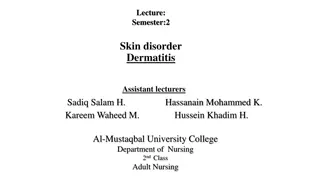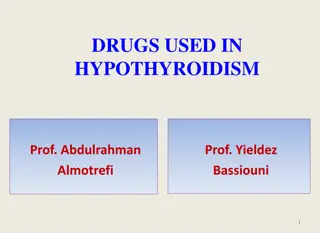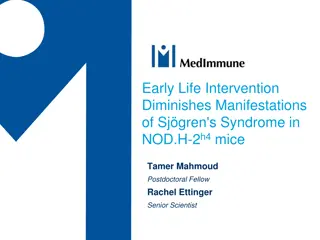Pathology Acute kidney injury
Guidelines of renal biopsy, types of acute kidney injury, clinical manifestations, and pathological findings in this comprehensive lecture. Explore the normal anatomy and histology of the kidney, terminology, etiology, pathophysiology, and more.
7 views • 17 slides
Equipment Management - LABS FOR LIFE PROJECT - INDIA
Histopathology and cytology equipment, focusing on the tissue processor, important parts, maintenance, and steps in tissue processing. Understand the significance of these tools in the microscopic examination of tissues for disease manifestations.
5 views • 30 slides
Tuberculosis
The different types of tuberculosis, its clinical manifestations, pathophysiology, and how it spreads. Discover the signs and symptoms, diagnostic methods, and available treatment options for tuberculosis.
5 views • 23 slides
Understanding Disinformation in Public Authorities
Explore the impact and manifestations of disinformation in public authorities, including dangerous behaviors, misinformation, social unrest, and more. Visualize the consequences and amplification cycle of disinformation.
4 views • 32 slides
TAKAT values giving our clients delightful stones and adornments,
TAKAT values giving our clients wonderful stones and adornments, extraordinary craftsmanship and uncommon help. Their manifestations are painstakingly planned with an emphasis on quality, joining old plan techniques with the most recent innovative advances
2 views • 15 slides
Immune-deficiencies
Immune deficiencies can be classified into primary hereditary disorders based on clinical presentations, including cell-mediated, antibody-mediated, non-specific, and complement activation deficiencies. Major clinical manifestations of immune disorders range from B-cell deficiencies to phagocytic ce
2 views • 46 slides
Understanding Rhinosinusitis: Symptoms, Causes, and Classification
Rhinosinusitis, formerly known as sinusitis, is an inflammation affecting the paranasal sinuses, nasal mucosa, and nasal cavity. This condition is categorized based on the duration of symptoms as acute, subacute, or chronic. Various factors contribute to the development of rhinosinusitis, including
3 views • 46 slides
Understanding Wolfram Syndrome: Symptoms and Implications
Wolfram Syndrome, also known as DIDMOAD, is a rare genetic disorder affecting about 1 in 160,000-770,000 people worldwide. It is characterized by the presence of Diabetes Insipidus, Diabetes Mellitus, Optic Atrophy, and Deafness. The primary genetic mutation in the WFS1 gene leads to various symptom
0 views • 22 slides
Epidemiology of hepatitis C in Ireland
Hepatitis C, a viral infection affecting the liver, has notable implications in Ireland, with key transmission routes, clinical manifestations, and long-term consequences shaping its epidemiology. From transmission patterns to chronic infection risks, understanding the natural history and prevalence
0 views • 24 slides
Understanding Bovine Anaplasmosis: Causes, Symptoms, and Management
Bovine anaplasmosis is an infectious disease in ruminants caused by Anaplasma species transmitted by ticks. This article covers the etiology, host susceptibility, transmission methods, symptoms, and life cycle of the disease. It highlights the age-related susceptibility in cattle and provides insigh
6 views • 10 slides
Dermatologic manifestations of diabetes mellitus.
The presentation slides discuss various dermatologic manifestations of diabetes mellitus, including acanthosis nigricans, diabetic dermopathy, acrochordons (skin tags), and necrobiosis lipoidica diabeticorum (NLD). Each feature description, location, mechanism, and treatment options are detailed alo
8 views • 10 slides
Understanding Neurodiversity in the Workplace
Explore the concept of neurodiversity, its manifestations in the workplace, and the role it plays for individuals with conditions such as ADHD, Autism, and Dyslexia. Learn how workplaces can be more inclusive and supportive of neurodiverse individuals.
0 views • 13 slides
Understanding Lycopodium as a Tri-Miasmatic Remedy
Lycopodium is classified as a tri-miasmatic remedy, addressing psoric, sycotic, and syphilitic symptoms. Tri-miasmatic remedies include Arg-nit, Calc-carb, Carcinosin, Causticum, and others. Dr. Sonny Mon presents insights on miasms and the fundamental role they play in chronic diseases according to
0 views • 16 slides
Cutaneous Manifestations of Systemic Diseases: Endocrine Disorders and Diabetes Mellitus
Explore the cutaneous manifestations of systemic diseases, particularly focusing on endocrine disorders like diabetes mellitus. Learn about the dermatologic signs associated with conditions such as hypothyroidism, hyperthyroidism, Addison's disease, and Cushing syndrome. Discover specific manifestat
0 views • 88 slides
Understanding Racial Disparities and Injustice in America
Delve into the critical examination of racial disparities and injustice in America's criminal justice system through works like "The New Jim Crow" by Michelle Alexander. Explore the impact of mass incarceration, societal labeling, and historical contexts that perpetuate racial caste systems. Engage
0 views • 17 slides
Understanding Cholestasis: Etiology, Clinical Manifestations, and Complications
Cholestasis is characterized by reduced bile flow and elevated direct bilirubin. It is critical to differentiate it from neonatal jaundice. In conditions like biliary atresia and 1-antitrypsin deficiency, early diagnosis and intervention are crucial to prevent liver failure. Clinical manifestations
5 views • 14 slides
Understanding Monarchy: A Study in Persuasive Appeals
Introduction to the concept of monarchy as a form of government and its various manifestations, exploring persuasive appeals and the application of ethos through the perspective of a queen. The content delves into the role of a monarchy in modern society and encourages critical analysis through tran
10 views • 18 slides
Anatomy of Hand and Wrist: Structures and Functions Overview
This lecture covers the anatomy of the hand and wrist, focusing on the deep fascia, flexor and extensor retinacula, and the insertion of tendons. It explores the structures passing superficial and deep to the flexor retinaculum and the small muscles of the hand. Important details about the carpal tu
1 views • 22 slides
Dehydration Risk Awareness Tool (RAT) Overview
The Dehydration Risk Awareness Tool (RAT) presented by The Virginia Department of Behavioral Health and Developmental Services aims to educate DSPs, caregivers, and support coordinators about the importance of recognizing, preventing, and addressing dehydration. The tool covers topics such as signs
1 views • 20 slides
Shock Case Studies: Patient Management Scenarios and Interventions
Explore patient scenarios of hypovolemic shock post-surgery, learn key assessments, prioritize actions, recognize shock manifestations, and apply interventions. Dive into the complexities of patient care in critical situations.
0 views • 60 slides
Unraveling a Puzzling Blood Disorder: A Genetic Inquiry
A Chicago physician, Dr. James Herrick, encountered a mysterious blood disorder in a West Indies student back in 1904. This condition, characterized by fatigue, joint pain, yellowish eyes, and an affected family history, poses a genetic inheritance puzzle. Investigations into Mendelian inheritance p
0 views • 16 slides
Case Review: Diagnostic Dilemma in Urology - Management Approach for a Patient with Abdominal Pain and Fever
A 58-year-old man with a history of diabetes and hypertension presents with fever and abdominal pain, raising multiple differential diagnoses including symptomatic AAA, pyelonephritis, acute appendicitis, complicated urolithiasis, or diabetic ketoacidosis. The case explores clinical manifestations,
1 views • 35 slides
Understanding the Pathophysiology of Epilepsy and Seizures
Epilepsy is a group of disorders characterized by recurrent, unprovoked seizures. Seizures are sudden surges of electrical activity in the brain that can cause alterations in sensation, behavior, or consciousness. They can be classified as partial or generalized based on their origin and clinical ma
2 views • 14 slides
Modeling of Serials in IFLA LRM Module 12 by PCC
Serials in library cataloging are modeled as complex constructs in IFLA LRM with considerations for whole/part and aggregation relationships. This module explores the intricacies of serial manifestations, issue manifestations, and the concept of WEM lock, providing insights into collocating closely-
0 views • 15 slides
Understanding Chronic Obstructive Pulmonary Diseases (COPD) and Emphysema
Chronic Obstructive Pulmonary Diseases (COPD) encompass conditions like chronic bronchitis and emphysema, typically caused by factors like cigarette smoking. This presentation delves into the clinical and functional variances between chronic bronchitis and emphysema in COPD patients, along with an e
1 views • 40 slides
Mycoplasma Genitalium Management Guidelines for Adults
This guideline aims to assist clinicians in recognizing common clinical manifestations of M. genitalium infection, providing evidence-based recommendations on screening, diagnostic testing, and treatment. It emphasizes not routine screening for asymptomatic individuals but testing for those with per
1 views • 9 slides
Understanding Obsessive Compulsive Disorder (OCD) - A Comprehensive Overview
OCD is a mental health condition characterized by obsessive thoughts and compulsive behaviors. Common obsessions include fears of harm, contamination, and the need for order, while compulsions involve repetitive actions like cleaning, checking, and ordering. The cycle of OCD perpetuates these behavi
0 views • 15 slides
Understanding Rickettsia: Pathogenesis, Clinical Manifestations, and Diagnosis
Rickettsia, a genus of Gram-negative bacteria transmitted by arthropods, is responsible for diseases like Rocky Mountain spotted fever. It causes symptoms such as high fever, rash, and severe headache. Laboratory diagnosis involves serology and isolation from experimental animals. Learn more about R
1 views • 9 slides
Understanding Systemic Manifestations of AIDS
Human Immunodeficiency Virus (HIV) is a retrovirus causing Acquired Immunodeficiency Syndrome (AIDS). HIV leads to immune system destruction, making individuals vulnerable to opportunistic infections and tumors. Common sexually transmitted diseases like syphilis, chlamydia, and gonorrhea are discuss
6 views • 15 slides
Oral Manifestations of Systemic Diseases in Dentistry
This content explores various systemic diseases and their oral manifestations relevant to dentistry. It covers associations between heart disease and periodontal disease, effects of chronic corticosteroid use on the pulmonary system, endocrine disorders like diabetes and thyroid issues, autoimmune d
1 views • 63 slides
End-of-Life Care: Understanding Physical Manifestations and System Responses
End-of-life care focuses on addressing the physical and psychosocial needs of individuals and their families during the dying process. It aims to provide comfort, supportive care, and improve the quality of life in the remaining days. Death occurs when vital organs cease to function, and specific ph
0 views • 15 slides
Understanding Cellular Injury and Its Manifestations
Cellular injury can occur due to various factors like physical trauma, chemicals, radiation, and biologic agents. This process can lead to reversible or irreversible damage in cells, affecting their normal functions and possibly leading to cell death. Manifestations of cellular injury include cellul
0 views • 9 slides
Understanding Cutaneous Manifestations of HIV and AIDS
Human Immunodeficiency Virus (HIV) is a lentivirus that infects CD4 T lymphocytes, leading to Acquired Immunodeficiency Syndrome (AIDS). Cutaneous manifestations of HIV/AIDS vary depending on the stage of infection and CD4 T cell counts. Early signs include exanthem, oral hairy leukoplakia, candidia
0 views • 17 slides
Skin Manifestations of Connective Tissue Diseases - Lecture Highlights
This lecture series discusses the various skin manifestations of connective tissue diseases, focusing on Lupus Erythematosus and other related conditions. It covers different types of Lupus, its effects on the body systems, treatment options, and psychosocial impacts. Additionally, the presentation
0 views • 76 slides
Understanding Upper and Lower Motor Neuron Lesions: Effects and Manifestations
This content delves into the intricacies of upper and lower motor neuron lesions, detailing their effects and manifestations in the human body. It explores the causes, types of paralysis, reflexes, muscle tone changes, and the impact of lesions at various levels of the motor system. The insights pro
0 views • 45 slides
Clinical Manifestations and Complications of Neisseria Gonorrhoeae Infection
Neisseria gonorrhoeae, also known as gonococcus, is a bacterial pathogen responsible for gonorrhea. The virulence factors of N. gonorrhoeae include pili/fimbriae for adhesion, outer membrane proteins like Porin for protection, opacity-associated protein for adhesion to neutrophils, and more. Clinica
0 views • 15 slides
Understanding Dermatitis: Causes, Types, and Clinical Manifestations
Dermatitis is a common skin disorder characterized by inflammation, itching, redness, and skin lesions. This article explores the etiology, types (such as contact dermatitis and atopic dermatitis), and clinical manifestations of dermatitis, including acute and chronic phases. Learn about the risk fa
0 views • 17 slides
Drugs Used in Hypothyroidism and Their Effects
Hypothyroidism is characterized by an underactive thyroid gland, leading to a variety of symptoms. This detailed presentation covers the causes, manifestations, and treatments of hypothyroidism, with a focus on the drugs used for treatment. Learn about different classes of medications, their mechani
0 views • 20 slides
Exploring the Divine Creations and Manifestations
Delve into the intricate details of creation and manifestations according to ancient texts, understanding the diverse inhabitants and landscapes across the universe. Learn about the purposeful organization of different beings in various environments, guided by the profound laws of nature and the int
0 views • 55 slides
Early Life Intervention Diminishes Sjögren's Syndrome Manifestations in Mice
Early life intervention has been shown to reduce the clinical manifestations of Sjögren's syndrome in NOD.H-2h4 mice, which mimic key features of the human autoimmune disease. The syndrome is characterized by salivary gland autoantibodies, ectopic lymphoid follicles, reduced salivary and tear flow,
0 views • 19 slides


